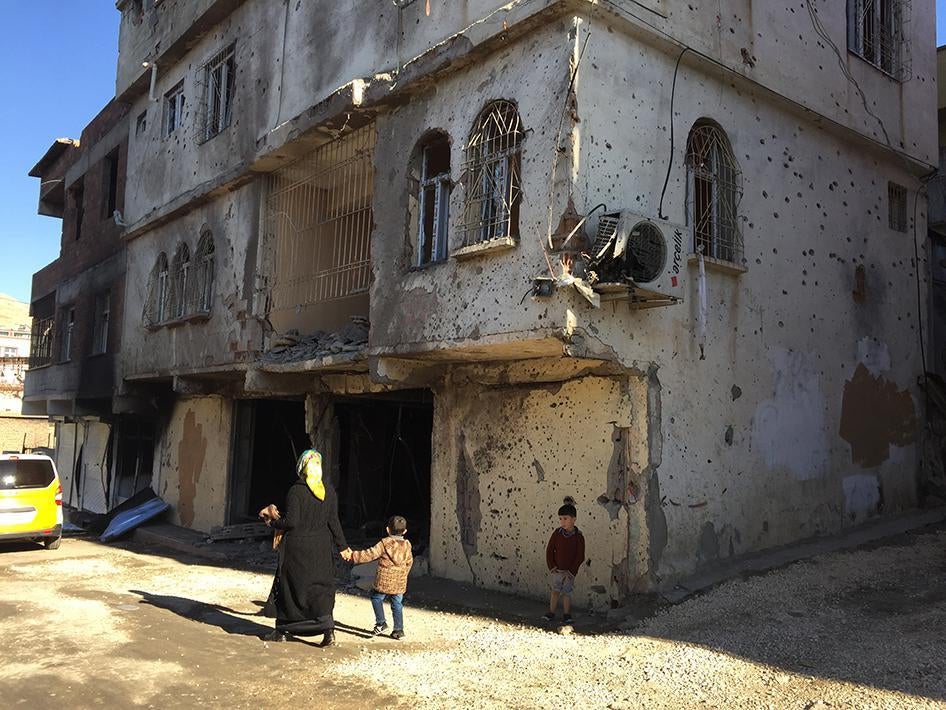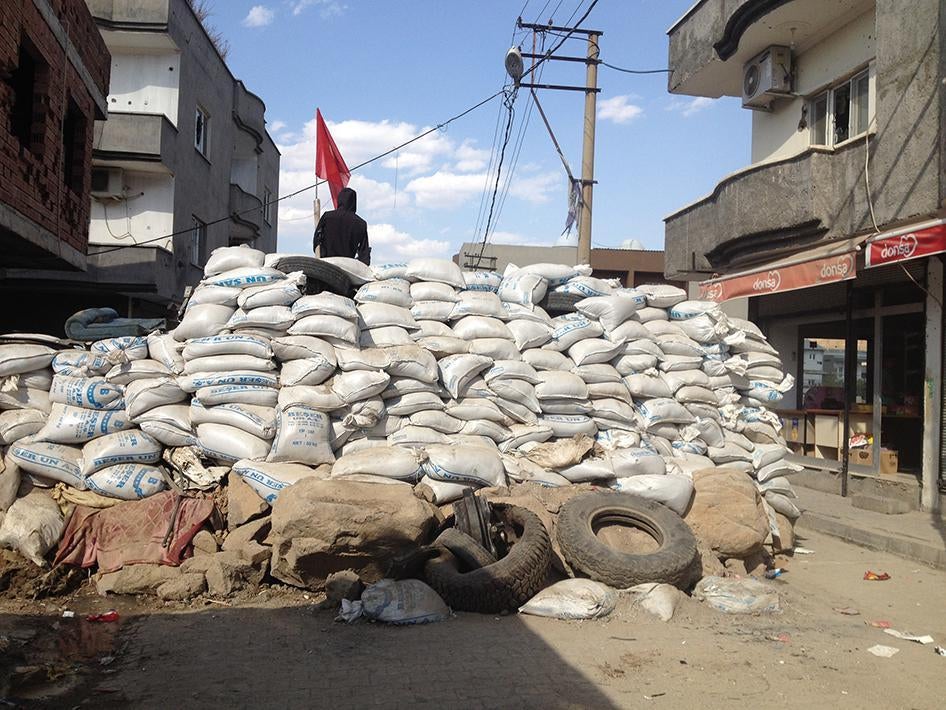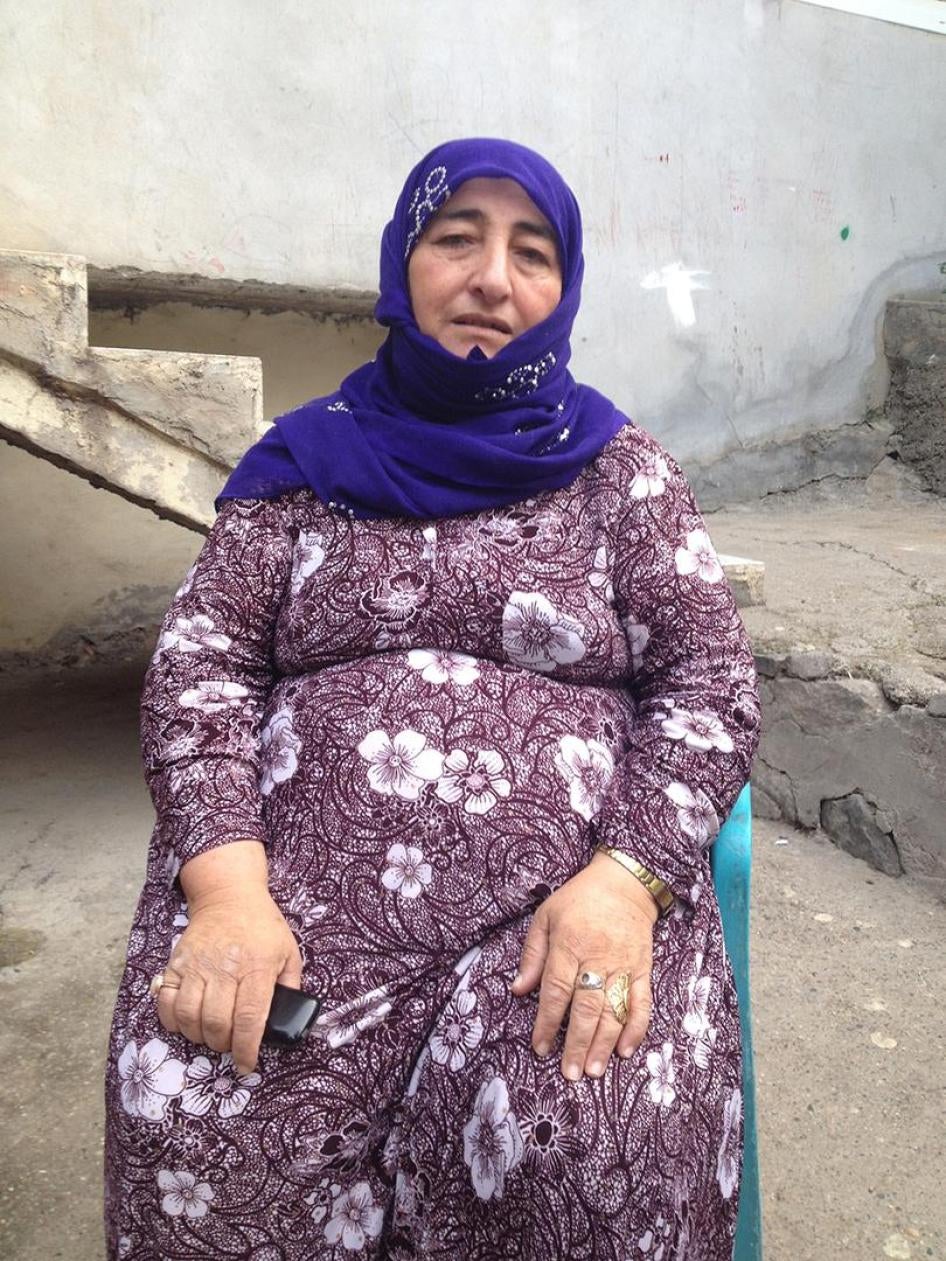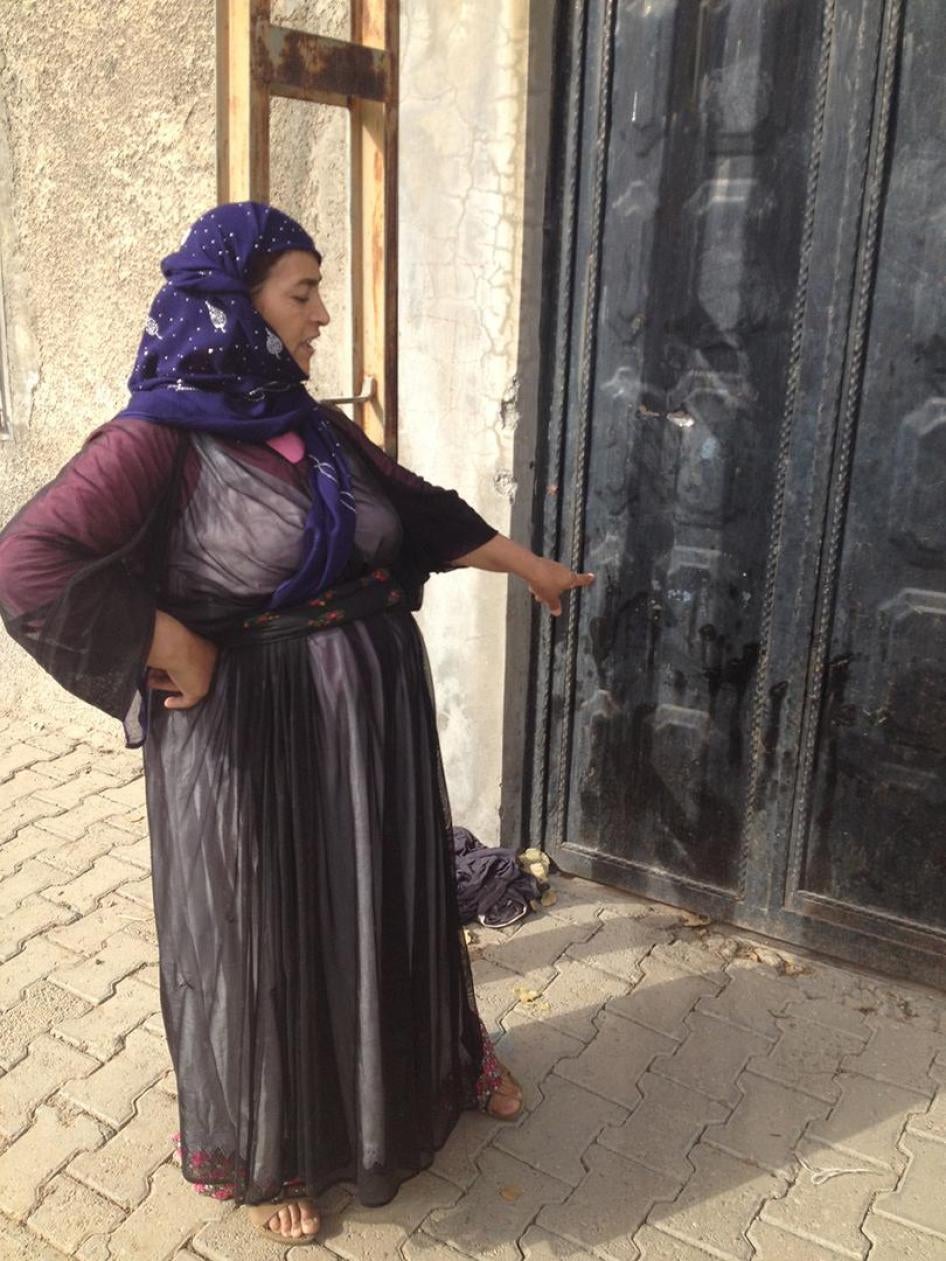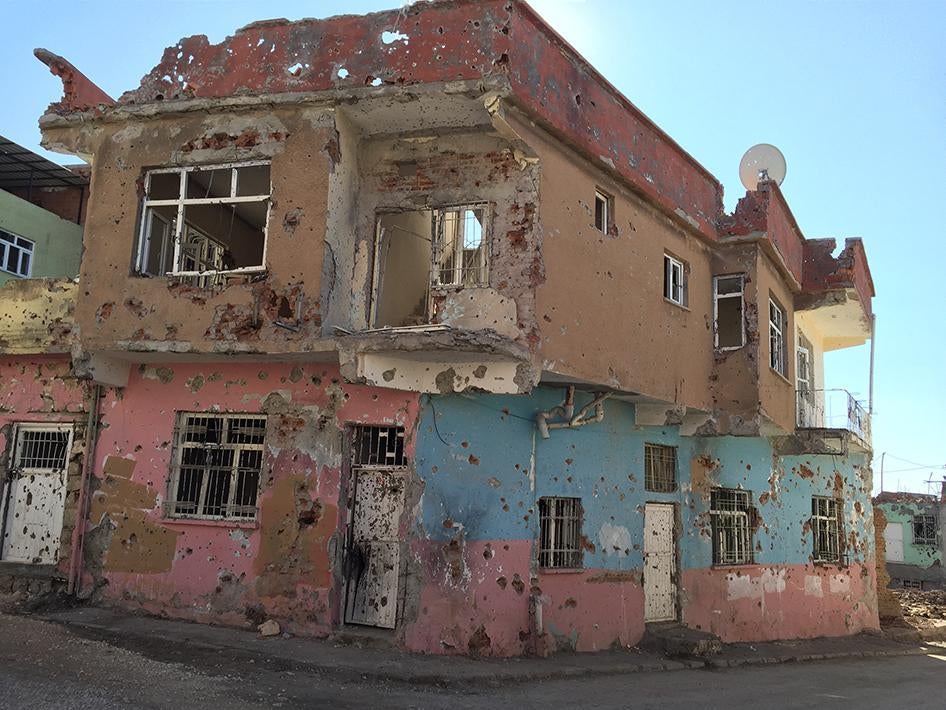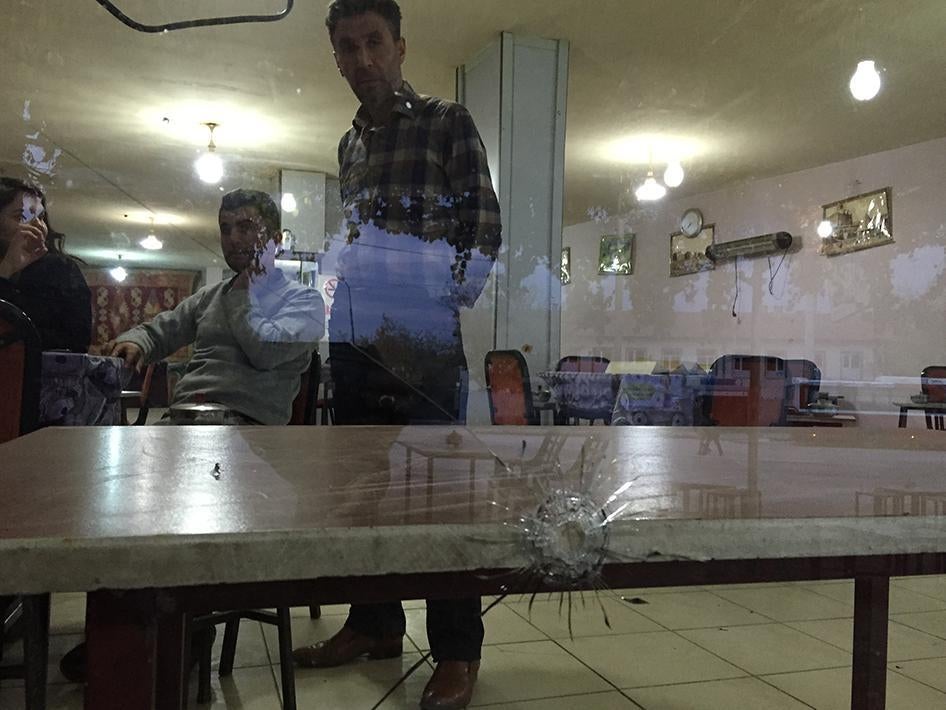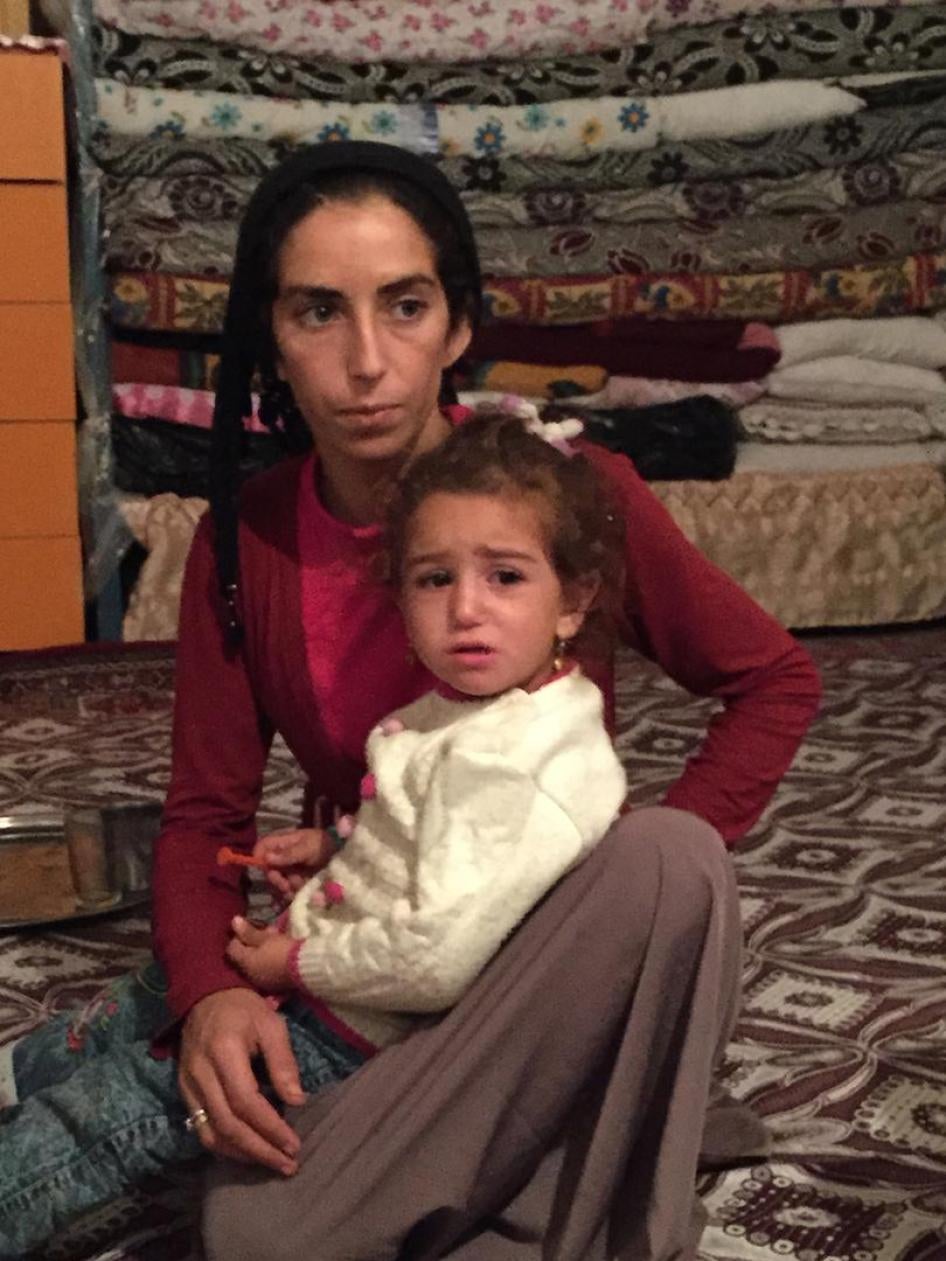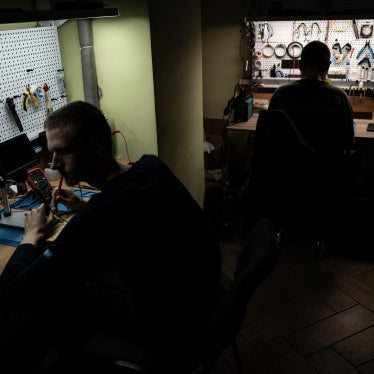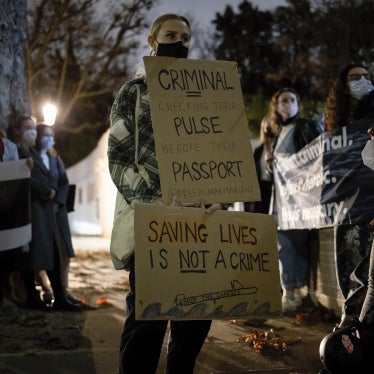(Istanbul)— Kurdish civilians, including women, children and elderly residents, have been killed during security operations and armed clashes since July 2015 in southeastern Turkey. Local human rights groups have recorded well over 100 civilian deaths and multiple injuries. After unprecedented military deployments to the region in recent days, several cities are under curfew and some of their neighborhoods the scenes of shelling by the military and heavy clashes with armed Kurdish groups. The civilian death toll is likely to rise steeply in the coming days.
Human Rights Watch focused on police and military operations during three extended curfews in September and November, documenting 15 of the killings of civilians in detail through interviews with relatives and witnesses as well as the accounts of eight civilians injured with gunshot wounds and shrapnel, and three cases of serious ill-treatment in detention. Wounded people have been denied access to medical treatment. The populations of entire neighborhoods have had their water and electricity cut during state-imposed curfews and have been left without access to food. Many have fled their homes to escape fighting.
“The Turkish government should rein in its security forces, immediately stop the abusive and disproportionate use of force, and investigate the deaths and injuries caused by its operations,” said Emma Sinclair-Webb, senior Turkey researcher at Human Rights Watch. “To ignore or cover up what’s happening to the region’s Kurdish population would only confirm the widely held belief in the southeast that when it comes to police and military operations against Kurdish armed groups, there are no limits – there is no law.”
Witnesses told Human Rights Watch that security forces repeatedly opened fire on anyone on the streets or who left their homes, failing to distinguish between people who were armed and those who weren’t and making no assessment of the threat an individual posed or the necessity of using lethal force.
Clashes have taken place between government forces and armed opposition fighters since the breakdown of the Turkish government’s peace process with Abdullah Öcalan, the imprisoned leader of the Kurdistan Workers’ Party (PKK). In towns throughout the southeast massive security operations are under way against an armed movement, the Patriotic Revolutionary Youth Movement (YDG-H), associated with the PKK. The youth movement’s supporters have dug trenches and erected barricades to seal off neighborhoods.
The eight deaths in the city of Cizre, in Şırnak province, during a curfew in September and four deaths in the city of Silvan and three in Nusaybin during November curfews, documented by Human Rights Watch are only a sample of the civilian deaths and injuries that occurred during this period. While it is clear from evidence collected by local groups that the death and injury toll is much higher, a full investigation is needed to determine precise numbers, to determine who is responsible for the deaths in each case, and to determine whether any of the larger number killed were participating in the fighting. In the 15 deaths documented by Human Rights Watch, the authorities have failed to complete investigations despite a clear obligation to do so under Turkish domestic and international human rights law.
Witnesses in Cizre and Silvan told Human Rights Watch that when people tried to get an ambulance for injured people, the emergency services told them it was not possible for an ambulance to come and that police blocked them when they tried to take wounded victims to hospitals by car.
Since August 16, provincial authorities in the southeast have announced repeated prolonged curfews in whole cities and towns or in particular neighborhoods. During the curfews, lasting up to two weeks, officials have severely restricted people’s freedom of movement and prevented access to the area by observers or media.
During the curfews, Special Operations Police teams and other security forces have conducted counter-terrorism operations against the armed Kurdish youth movement, using armored vehicles and sometimes tanks and heavy artillery against their barricades. The supporters of the Kurdish armed group have dug trenches, often planted with explosives and erected barricades to seal off neighborhoods.
Turkey is party to both the European Convention on Human Rights (ECHR) and the International Covenant on Civil and Political Rights (ICCPR), which protect the rights to life, bodily integrity, and security. As part of those obligations, medical treatment must be provided promptly to anyone who is injured. The Turkish authorities have a history of failing to carry out effective investigations into killings in the southeast, in particular in cases where state agents were alleged to have been responsible for unlawful killings, resulting in a series of rulings by European Court of Human Rights that Turkey violated the right to life.
While Turkish authorities have a duty to protect the population from violence by armed groups, and may use reasonable force to deal with threats to the right to life, they must also ensure that their policing operations, including the imposition of any curfews, respect the rights of those living in affected areas, are proportionate to the threat faced and that people are able to access basic services including medical treatment.
In a November 18, 2015 statement, Council of Europe Commissioner for Human Rights Nils Muiznieks said:
While I reiterate the right and obligation of the Turkish state to fight terrorism, the methods employed in this fight have to respect the human rights guarantees enshrined in international standards, in particular the European Convention on Human Rights. Imposing open-ended, round-the-clock curfews in entire neighbourhoods or towns until further notice represents a massive restriction of some of the most fundamental human rights of a huge population. Their frequent and widespread use in South-Eastern Turkey since August does not appear to satisfy the criteria of proportionality and necessity in a democratic society.
A full investigation is needed to determine in each case whether members of the security forces unlawfully killed civilians or whether civilians were killed in crossfire, by armed fighters or by flying shrapnel during armed clashes. The investigation should include interviews with all available witnesses, an on-site investigation, detailed autopsies and other forensics, and the collection of all unedited video footage from cameras on armored vehicles and other video shot by police units or civilians,.
The government should immediately make absolutely clear that the security forces should not prevent anyone from reaching medical assistance or impede medics and ambulances from responding to the wounded, and hold anyone who does accountable, Human Rights Watch said.
Armed Kurdish groups associated with the Kurdistan Workers’ Party should stop digging trenches planted with explosives and erecting barricades to prevent state authorities from entering neighborhoods, Human Rights Watch said. The practice has had an adverse impact on the population, threatening their right to access medical care and impeding the delivery of other emergency services.
“Curfews, police operations, and armed clashes have made life for many people in southeastern towns and cities unbearable, and deadly dangerous,” Sinclair-Webb said. “It demonstrates the very real human cost of the breakdown of the Kurdish peace process.”
Civilian Deaths
Human rights groups including Mazlum Der and the Human Rights Association, and the Diyarbakir Bar Association, have reported the killings of scores of men, women and children in the southeast in recent months. Among the dead and wounded are young children, teenage boys, adult men and women. Some teenagers and young men who were killed may have been armed and actively participating in the armed clashes against the police, and others may have been unarmed but in the vicinity.
Human Rights Watch interviewed relatives and friends of 15 people in Cizre, Silvan and Nusaybin who had been shot dead during curfews, while police and other security forces laid siege to neighborhoods.
Some witnesses said that the security forces were responsible for the shooting that killed their loved ones, but in the absence of a comprehensive investigation it is not possible to be conclusive about the full circumstances of all of the killings, and who bears criminal responsibility.
The death toll of police officers, alleged members of the PKK youth wing, and PKK members has also run into the hundreds, although precise numbers are difficult to estimate.
Human Rights Watch interviews with the relatives of some of the civilians killed and contact with prosecutors indicate that there have yet to be effective investigations into the civilian deaths as required under international law. Turkish authorities’ official statements barely acknowledge that many unarmed citizens are among the dead which sends a worrying message about the likelihood that they intend to ensure full and prompt investigations into the deaths.
A public prosecutor from Cizre assured Human Rights Watch in September that investigations were ongoing into the deaths during the curfew from September 4 to 12.
But the provincial governor of Şırnak, where Cizre is located, told the media on September 17 that along with the destruction of large amounts of explosives, “the bodies of 7 terrorists were recovered, 17 members of the separatist terrorist organization were detained” and that “losses to the terrorist organization were estimated at around 40-42.”
The governor made no mention of the deaths of ordinary citizens although Diyarbakır Bar Association and other groups identified 16 civilians who died of gunshot wounds and shrapnel injuries and another 5 who died because they could not reach medical treatment during the curfew. Human Rights Watch documented 8 of the deaths from gunshot wounds.
When the curfew in Silvan was lifted the governor of Diyarbakır, in which Silvan is located, announced that two police officers and a gendarme, “2 citizens” and “10 members of the separatist terrorist organization had been killed.” Human Rights Watch documented five deaths, four of whom appear to have been civilians. Similarly, in Nusaybin the deputy governor’s official statement referred to the “death of three citizens” from “shrapnel wounds.” Human Rights Watch documented three deaths of civilians from gunshot wounds and heard of other cases. Neither the Silvan deputy governor nor the Nusaybin deputy governor responded to Human Rights Watch requests for meetings.
Accounts from Cizre and Silvan
Human Rights Watch conducted detailed interviews with 47 people in October and November about the September 4-12 curfew in Cizre, the November 3-14 curfew in Silvan, and the November 13-26 in Nusaybin. While the primary focus was on potential violations of the right to life and obstacles to medical treatment for injured people, many of those interviewed also described restrictions on movement, interference with access to water and food, and prolonged power cuts.
Cizre curfew, September 4-12
Human Rights Watch interviewed relatives and neighbors of 8 of a provisional total of 16 people whom the Diyarbakır Bar Association reported to have died of gunshot wounds. The Bar Association reported that another five people died because they could not get medical care during the curfew.
Human Rights Watch also spoke to a father whose baby had been injured by gunshots; four other adults similarly wounded, one of whose leg had to be amputated from the knee down; relatives of a man who was in intensive care after the amputation of his leg as a result of gunshot wounds; and two people who had each lost vision in an eye as a result of shrapnel or splintered glass.
Bahaeddin Yağarcık (38), a Cizre-born teacher, described the impact of the curfew:
On September 4 there was an announcement at 7 p.m. saying there would be a curfew, and at 8 p.m. it was imposed and shooting on Botaş Street started immediately from around the municipality cultural centre where the police were positioned. Our house looks onto Botaş Street and got sprayed with machine gun fire. On the third day of the curfew we left the house and went to my younger brother’s house on the street behind ours, which was quiet.
But then shells were fired, he said.
With my wife, children, mother and other relatives we were in all 18 people and were in one room from 6:30 p.m. on the fourth night to 6 a.m. the following morning. My mother was ill with a heart condition, my wife was struck silent with fear. I tried to calm everyone down. There was no food, we couldn’t leave the room to go to the toilet. We just stayed in that one room all night. The windows shattered and the building shook. Everyone was traumatized. My wife hasn’t got over it and still shakes with fear.
At 6 a.m. we left for a third house where my maternal aunt lives. There were five or six families there, about 50 or 60 people, and there was no place even to sit. They had made a hole in an adjoining wall to my older sister’s house next door, so that we were able to go through to it. There we stayed in two rooms. There was no water by then and we used an old unsused well and lowered a rope down to get the muddy water at the bottom. But it was not drinkable so we tried using cloth to filter it.
On the seventh day, my sister went to try to get water and she was nearly shot. We went to another empty house through the window and drank their water. That day the water was restored but there was sometimes still no electricity and it was 40 degrees. We could hardly breathe in that heat. I was shot at when I tried to look out. We were so afraid for our relatives. There were military marches being played from armored vehicles and announcements over loudspeakers like “Nur neighborhood, Apo’s bastards [referring to Abdullah Öcalan, the imprisoned PKK leader ], Armenian bastards, we will send you to hell.” On the walls the police had written slogans like “Don’t play if you are going to cry.”
A truck driver, Ahmet Edin, 38, said that while he was away in northern Iraq, his wife, Maşallah Edin. 35, and his son’s wife, Zeynep Taşkın, 17, were shot dead right outside his brother’s home in the Cudi neighborhood at around 10 p.m. on September 8 as they were leaving to go back to their own house nearby. Zeynep Taşkin was carrying her 6-month-old baby, Berxwedan, who was wounded but survived.
Ferhan Dayan, 27, Ahmet Edin’s cousin, who was in the house when the women were shot, said that efforts to recover the women’s bodies and the baby were impeded by repeated firing by police snipers at anyone who ventured outside. He said his father, Ekrem Dayan,56, had been with the women and had been shot in the foot at the door and had fallen back inside, so the others could pull him to safety.
He said that after an interval another relative, Ayşe Kolin, 50, had attempted to reach the two women but was shot in the hip. Both Ekrem Dayan and Ayşe Kolin had been operated on and were still under medical treatment, family members said.
İdris Elinç, present at the time of the shootings, said: “We were able to recover the bodies of Maşallah Edin and Zeynep Taşkın an hour and a half or two hours later. We thought all three were dead and were amazed to find baby Berxwedan alive but injured between the two women’s bodies.”
Those interviewed about the shootings all emphasized that the place where the five people were shot is in the Cudi neighbourhood on a steep exposed slope and highly visible from other neighbourhoods in Cizre, and that they believed snipers positioned on high buildings in another part of the town could have targeted the location.
Emine Çağırga, a housewife, said that her 13-year-old daughter, Cemile, had been shot dead in the street just outside their house in the Cudi neighbourhood and showed the bullet marks in the door: of the yard. The location is fairly close to the Edin family’s home and is on an exposed hillside clearly visible from a great distance from other parts of Cizre. Emine Çağırga and other relatives Human Rights Watch talked to made the credible suggestion that snipers positioned on high buildings in another part of the town could have targeted the location.
It was Sunday evening [September 6] and we heard shooting and saw that Cemile had fallen down. I said “Get up, get up.” She called “Mother, mother!” and died. We got her body into the house and I held her hands till morning and put ice on her body. Then we washed her body the following morning and I put henna on her hands and we wrapped her in her shroud and put her body in the freezer. At the end of the second day in the evening the Şırnak parliamentarians came and took Cemile’s body to İdil Street to the mosque there. Her autopsy was carried out in Şırnak and then we buried her.
Fevzi Süne, 59, said that his wife Meryem Süne. 53, was shot dead at the entrance to their home in the Nur neighbourhood:
On September 8, I was sitting inside and at 9 p.m. My wife, Meryem, went outside to do her abdest [ritual ablutions before prayer]. As she was closing the outer door to the yard she collapsed. We carried her in. First we thought it was just pellets [from a hunting rifle] but it wasn’t. She had internal bleeding from a bullet. She was alive but we phoned for an ambulance and they told us they couldn’t send one. We said we have Republic of Turkish IDs, that we’re not the PKK. I believe she would have lived had we been able to get her to hospital. She died at around 12. We kept her body with us all night and the next morning put the body in a cold storage place till 4 p.m.in the afternoon the next day when we managed to get her body to the hospital morgue.
When they burned our village in the 1990s and we left, we said, “Perhaps they will let us educate our children,” but they didn’t permit that. In 1992 we couldn’t take anything but our mattresses with us. We lost our village, our homes, everything. We said, “Perhaps we’ll be able to look after our children,” but they didn’t permit that either. Our children have grown up traumatized.
His son Salih, said:
I gave a statement at the hospital where we took my mother’s body. The police asked me for the details of where she was shot, when, how and so on. The police wrote a hand-written record, which I signed and I made the same statement to the prosecutor who was in the next room in the hospital. My mother’s body was then sent to Şırnak for the autopsy. We were given the body back on September 13 and we buried my mother in the cemetery that day. We later also gave a statement to the prosecutor with our lawyer. The autopsy report states that my mother was killed by a bullet wound and the bullet was found in her body. No one from any official body has visited us.
Gurbet Çağdavul said that her son, Sait Çağdavul. aged 18, was shot dead in the Nur neighbourhood by forces she believes were police:
Sait worked in a shop for a relative of ours. On the second night of the curfew we ran from our house because armored vehicles were shooting into our street. My son was shot on his left side in the chest and in the throat right at the door of the house. A neighbor managed to phone the emergency services but no ambulance could get here. The police didn’t allow it into the neighborhood. We managed to get Sait’s body to the mosque and it stayed there for three days and we couldn’t wash it because there was no water. Eventually 15 people, including members of parliament, together carried the body to İdil Street to an ambulance.
We haven’t heard from any official body. We haven’t been told anything about the procedures and whether there will be an investigation into Sait’s killing. There was just the sounds of bullets and shelling. The state should leave us alone, we wanted peace. We didn’t want our children to die, neither the soldiers nor the others. Our children are afraid of the state and can’t go anywhere.
In Cizre the state doesn’t recognize justice. Unless there is actual camera footage there is no possibility of the police going on trial. This is because we are Kurdish. Many people are afraid to go to hospital because they are afraid they will be arrested there.
Rahmet Erdin Agar, 34, said that her father, Eşref Erdin, 60, was shot dead on September 9 on the roof of his home in Nur Neighborhood:
For three days we just heard gunfire. My father went up the roof to see about the water tank because the water supply had been cut. There was no electricity. We were downstairs. He was gone for some time and didn’t come down. My stepmother went up to see what he was doing and discovered him face down in a pool of blood as if he were praying. He had been shot in the back but wasn’t dead. We called an ambulance on 112. We cannot come, they told us or we will be killed. We called emergency services on 155 and gave the license plate number of my father’s car so that they would know it was us coming.
We put the body in the car and drove out of the yard and as we turned the corner the police shot directly at us. We know it was the police because the firing came from where they were positioned. The car is a white jeep full of bullet holes and has a 33 number plate [a Mersin city number plate]. We had to reverse or we would have been shot. My father died. On September 11 with the help of a member of parliament, Faysal Sarıyıldız, we managed to carry his body to the hospital morgue.
Metin Cağlı said that his father, Salih Cağlı, was shot outside his home in the Nur neighborhood:
My father went to the door of the shop at about 9:30 or 10 p.m. at night on September 6 and we heard his shouts. There was no electricity. He had collapsed after being shot in the left leg and arm and was bleeding heavily. We took a door off the cupboard and used it as a stretcher to carry him on. We couldn’t get to the street where we would have been shot again and had to go through our neighbors’ homes by knocking a hole in our home to reach the next house. Our neighbors had already knocked holes in the walls between buildings and we passed through about seven houses to get my father to an ambulance.
We reached the Dalmışlar gas station on İdil Street by about 1 a.m. and got an ambulance. There were long delays and the ambulance was continually stopped and checked by the police on the way to the Cizre hospital, then we were sent to Mardin hospital and police checked the ambulance three times on the road to Mardin. They would look into the ambulance and say “He’s dead.” My father’s heart stopped twice on the way and he was resuscitated. At 6 a.m. my father was operated on in Mardin and had his leg amputated from above the left knee. His left arm and chin is full of shrapnel pieces and he is still in hospital.
Şirin Sarak, 48, said her husband, Suphi Sarak, aged 51, was shot dead in Botaş Street while trying to help his neighbor Bahattin Sevinik, who had also been shot:
It was 9 or 9:30 p.m. on a Tuesday evening. The curfew had started the previous Friday. The electricity was cut and there were frightening sounds of shooting from outside in the street. We heard screaming from our neighbor Bahattin Sevinik and him shouting “Help!” Suphi couldn’t stand it and rushed out of the back door to try to reach Bahattin.
I followed him and tried to stop him going but he went ahead and then I heard shooting. My younger son looked out from the balcony and saw two police armored vehicles drive up and police drag Suphi’s body along the ground in the street and place it in an armored vehicle. It was only after the curfew was finished days later that we were able to go to the morgue in Şırnak to identify Suphi’s body. We had a call from the morgue asking us to come.
When Suphi was shot dead some TV stations stated that the police had discovered a PKK militant and said he was dressed in PKK uniform. Suphi was dressed in the traditional clothes of this region, leşkeri [the wide-legged Botan shalvar]. He was shot in the back many times.
I am alone. I have seven sons and three daughters. Two of my sons were not even able to come back to their father’s funeral because they are harvesting hazelnuts in the Black Sea region and couldn’t afford to come back until the seasonal work which we depend on is over.
Abdulhakim Anakin, 28, an accountant, said he was shot in Botaş Street, Nur neighbourhood, as he and Suphi Sarak tried to drive Sevinik to hospital:
Our neighbor Bahattin Sevinik was shot in the head in his home after praying. His brother Hüsamettin ran out and shouted and waved a phone with the light on, shouting in Kurdish and Turkish: “They killed my brother.” In the street there were 10 to 15 armored vehicles, maybe more. We didn’t know he was dead. Hüsamettin said he didn’t know how to drive a car to take him to hospital. I offered to take him to hospital. The car was in the yard and we put Bahattin in the car. I drove the car out by a meter or two.
As I was driving out Suphi Sarak, our neighbor appeared and looked through the window of the car and asked what had happened. He was dressed in leşkeri [the wide-legged shalwar outfit of the Botan region]. The street was full of Special Operations police armored vehicles and they opened fire on us, shot him, and shot me in my left hand, which was on the steering wheel of the car. He got hit by 10 bullets. I have a medical report stating that “metal fragments” entered my left eye, though it doesn’t specify what they are exactly. I stayed at home for six days and couldn’t get to hospital because we couldn’t leave the house. Someone we knew who was a nurse saw me and persuaded me to go. I had two operations on the hand and on the eye to remove the three “metal fragments”. I cannot see from my left eye and fear I have lost my sight.
We know what the state’s like. We have no security of life in Cizre. We are afraid of the blind bullets wherever they come from. Five different groups of police came and interviewed me. I haven’t been interviewed by a prosecutor yet, but I have filed a complaint.
Silvan curfew in three neighborhoods, November 3-16
Human Rights Watch spoke to 16 people in Silvan about the impact of the curfew there, including relatives and neighbors of five people who were shot dead during the curfew, three of which are included here.
Süleyman Ayrıç, 54, the elected head (muhtar) of the Tekel neighbourhood, described the situation during the curfew:
There were clashes but we could not see what happened exactly as we had to shelter inside to protect our lives. Most people escaped and went to other neighborhoods, to Diyarbakır, to other places. There was no one left in the neighborhood – just an old widow and a man who stayed here to look after his animals. I stayed here alone to protect our home. My family left.
There was no electricity and water for 12 days. On November 3 at 8 a.m. DEDAŞ [the electricity board] cut the electricity in this neighborhood and when I called them they said it was because of a fire risk. In another neighborhood one of the transformers was damaged and the electric got cut there. The reason the water was cut was because the pipe burst when the youths dug a trench. We had to get drinking water from that broken pipe in the trench. I told the youths that digging trenches was illegal countless times, but they ignored me.
Ramazan Duruk, 56, said:
We were oppressed by both sides. When there was a clash back on September 18, my old mother, Hanife Duruk, 93, had a heart attack and died. We managed to get her body to the mosque and only with the help of the parliamentarians could we get her body to the morgue. This should not be a war zone. The population lives here. We keep saying this to both sides. On the last two days of the November curfew, all the houses were searched by police teams and they came in and broke up everything. The police called it a clean-up operation and in the process they smashed in doors and people’s belongings.
The state here talks only to the elected headman (muhtar) and has absolutely no communication with us. There has been no communication with us through this whole period.
Erdal Özkan, 35, a construction worker, said:
I have five children and we were here for five days stuck in our home. We managed to get out finally and I came back on the ninth day of the curfew to find my house destroyed. I have photos of the damage but no one has come to look yet. The air conditioner was pitted with bullets and destroyed. There were bullet holes in cupboards. I am a worker – I build walls but there is no work now. I think this period is more violent than the 90s when there were the killings in Silvan by Hizbullah. In those days there was war and death but they targeted certain people. In this period the state’s bullets hit everyone.
Woman (name withheld but known to Human Rights Watch):
On the last day of the curfew, the soldiers paraded in a line through the streets holding guns as a show of strength. The crowd booed them and people shouted “Get out!” An announcement was made over a loudspeaker: “Well done, guys, Silvan has been cleaned of its terrorists.” The message to the population was “We have crushed you and continued on.” You should have seen some of the soldiers’ expressions – they were young men doing military service and some were deeply affected and unable to stand having to parade through the town. After these events I don’t feel like a citizen of this country.”
Kudbettin Tekin, the manager of the Dicle Kıraathanesi (café) in Silvan, said the café was shot at during the curfew, killing a customer, Mehmet Gündüz, 45, a taxi driver, and injuring several others. Two bullet holes through the window were still visible when Human Rights Watch visited the café. CCTV footage seen by Human Rights Watch shows that an armored vehicle passed by the café at the time the shots were fired and an investigation should determine whether the gunfire came from that vehicle or from another source.
At about 11 a.m. our café was shot at. Mehmet Gündüz was shot dead. That evening when there was no one in the café, the police broke down the door and searched the place. No one has come to see us, no prosecutor, no state authority. We want to know how this happened, who killed Mehmet Gündüz whose two children are left without a father, and whether the café was shot at from a passing armored vehicle as people suspect. Life in Silvan has been brought to a standstill.
Sevgi Gezici, 22, a mother of three young children who lives in the Tekel neighborhood, said that her husband, Engin Gezici, 24, and his aunt İsmet Gezici, were shot dead during the curfew:
On the third day of the curfew [November 6], no one was at home except me, my husband, Engin, and our three children. There was a trench right outside our home and we heard the sound of bombs and guns during a clash. There was no electricity, water or food, and Engin went out when the shooting stopped for a few minutes. He went out to see if we could leave our house because the children were so afraid. It was 11 a.m. and he went to see if there was a way of leaving or not and whether we could go. As he was returning he was shot just 10 meters from the house. He had nothing in his hands and wasn’t armed.
I heard the sound of shooting and heard voices and I looked out of the window and saw my husband on the ground shot. Two friends were beside him and they brought him in. Just a few minutes later his aunt İsmet Gezici ran to our house from her home and she was shot at our door. She shouted and we got her into the house wounded. My husband was dead. His aunt was shot in the hip from the direction of the town center but could speak to us and we carried her on a door we used as a stretcher and made a hole in the wall to get into a neighbor’s house. We managed that way to carry her and at around 1 p.m. got her to a relative’s home in Bahçelievler. She was taken to hospital in Diyarbakir and died there.
At around 10 or 11 p.m. Engin’s cousins Yılmaz Gezici, S.G. and O.G., managed to collect Engin’s body in their car but were stopped by the police and detained. They were taken to the garden of the Anti-Terror Branch and made to lie face down on the ground for hours and were beaten. The police shouted at them “Don’t call him cousin, call him terrorist.”
I will do whatever is needed to make sure there is a trial and the perpetrators are brought to justice. I will give a statement to the prosecutor. My husband worked in the summer in Muş as a shepherd, herding flocks. He provided for 10 people in his family. No one else works. They took away our only hope.
The state hasn’t contacted me or my family for a statement or anything else. We have no home of our own and pay rent. How are we going to manage to pay the rent of 130 TL for our house and 150TL for my father-in-law’s house when we have no income. If I work who will look after the children? My father-in-law has no work and mother-in-law is sick.
Human Rights Watch later interviewed Yılmaz Gezici, 36, a construction worker, by telephone. He said that he and his younger brothers S.G., 21, and O.G.,19 were subjected to hours of serious ill-treatment, beating and death threats at the Silvan Anti-terror Branch, after the police detained them in their car and accused them of absconding with a “dead terrorist’s body.” Yılmaz Gezici said he is pursuing a complaint with the prosecutor.
